Is Watermelon Healthy for You?
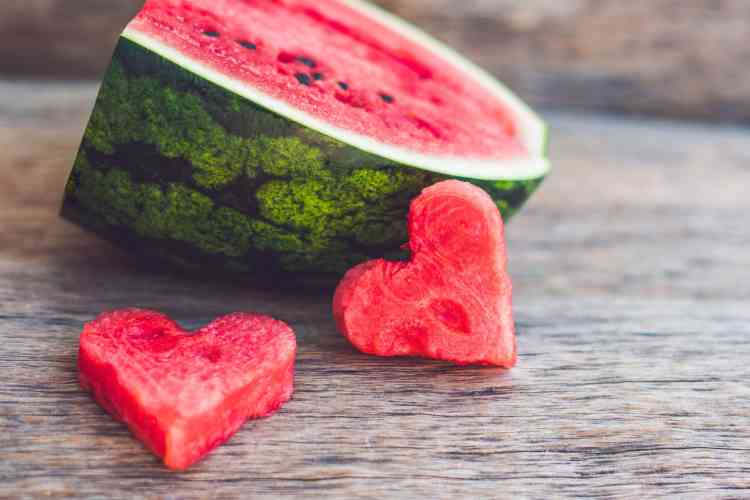
You’ve seen it called a summer superfood, but is watermelon healthy for you? This summery staple delivers juicy sweetness, hydration and a light dose of vitamins that fit easily into a balanced eating pattern.
As highlighted on the USDA Food Composition Database, it's a good source of vitamin C and contains some vitamin A, potassium and magnesium, among other vitamins and minerals. But just how good for you is watermelon? Is it worth the hype, or are there healthier snacks out there that provide everything watermelon does and more?
Let’s dive into the facts about watermelon to answer, once and for all: “Is watermelon healthy for you?” And if so, how healthy is watermelon compared to other favorite fruits?
Jump to Section
- Is Watermelon Good for You?
- How Healthy Is Watermelon for You?
- What Are the Health Benefits of Watermelon?
- How To Incorporate Watermelon Into Your Diet
Is Watermelon Good for You?
If watermelon is a key component of your diet, fear not: we’re not here to burst your bubble. The answer to the question: “Is watermelon good for you?” is definitely “yes.” But just how healthy is watermelon, exactly?
In general, watermelon offers hydration and a few vitamins while being low in calories and free of fat. These qualities make it clear that watermelon is healthy, and the answer to the question "Is watermelon good for dieting?" is undoubtedly, yes.
Although it’s low in fiber and protein, watermelon isn’t a very filling fruit. While we cover all the major health benefits of watermelon later in the article, here are the primary reasons that watermelon is good for you.
Hydration
One of the most commonly cited watermelon benefits is hydration: it does have "water" in the name, after all. And it’s impossible to overemphasize the critical importance of getting enough water for your health.
As UC Davis Health explains, consuming enough water and being properly hydrated is crucial for bringing nutrients to cells, protecting organs and joints, and maintaining body temperature.
That alone is enough to make watermelon one of the healthiest fruits you can eat (alongside drinking enough water), especially during hot seasons when you lose lots of fluids or if you regularly do intense exercise.
Lycopene and Beta-Carotene
However, that’s not the only health benefit watermelon offers. Another reason watermelon is healthy for you is its high concentration of lycopene, an antioxidant compound that offers potential health benefits that researchers continue to study.
A guide written by Cara Rosenbloom, RD, and reviewed by Katie E. Golden, MD, on GoodRx recommends consuming 8 to 21 milligrams of lycopene per day, with a 100-gram serving of watermelon having approximately 4.5 milligrams. This means one serving can contribute a meaningful amount of lycopene to your day.
Eating foods that contain lycopene is associated with markers of heart health in some studies. So not only does watermelon help with hydration, it also provides antioxidants that play a role in overall health.
Yellow watermelon is also a great variety to go for if you can get your hands on it because it is rich in beta-carotene, which means it can help support eye health. Other health benefits of beta carotene include supporting healthy vision and functioning as an antioxidant.
Research continues to explore its role in overall health. But while the nutritional profile is a bit different with yellow watermelon, fret not: watermelon is healthy for you in any color.
Vitamin Content for Skin Health
Another watermelon nutrition perk is its richness in key vitamins like A and C. According to WebMD, these vitamins play a role in supporting skin health. Additionally, lycopene, which we just covered, may support skin health and offer mild antioxidant protection from UV exposure. And you can’t forget that proper hydration is vital for skin health, too — another reason why its high water content makes watermelon healthy for you.
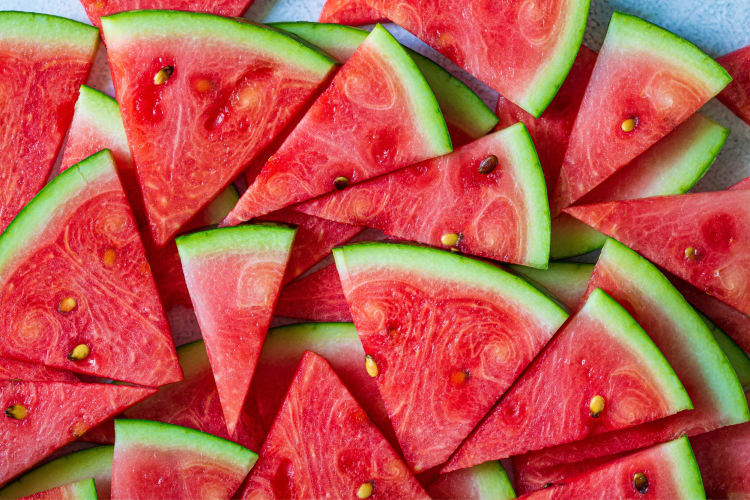
Potential Drawbacks of Watermelon
Is watermelon healthy if you’re watching sugar? In most ways, watermelon is healthy for you, but some people may want to use a little caution. That’s because while it’s low in calories and provides hydration and vitamin C, it also contains natural sugars and little fiber.
That can be great if you’ve just finished running a half-marathon at the height of summer, but if you have diabetes or another condition that makes you sensitive to blood sugar changes, watermelon may raise blood sugar faster than lower sugar, higher fiber fruits.
If you have diabetes and want to enjoy some watermelon, pairing it with protein or fat can help slow the rise in blood sugar, as covered by Medical News Today. Do note that watermelon has a sugar content similar to many fruits, so it makes sense to enjoy it in moderation if sugar is a concern.
It’s also wise for most people to keep portions reasonable, even with naturally sweet foods. This doesn’t make watermelon less healthy for you, but it does mean paying attention to serving size — think about a cup of diced fruit as a snack, which helps keep things balanced.

Is Watermelon Healthy for Weight Loss?
You might have met a dieter who swears by huge portions of watermelon as a way to fill your stomach for very few calories. In fact, such practices might have been what first led you to ask: “Is watermelon good for you?” The practice even has a name: The Watermelon Diet. But does it hold water?
Is watermelon good for you if you want to lose weight? Yes, watermelon is a good food to eat when you want to lose weight. But don’t run too far with that idea — a diet consisting entirely of one food is rarely an advisable way to lose weight. However, including watermelon as part of a balanced and varied diet, along with a good exercise plan, can help you lose weight in a healthy way.
Why Is Watermelon Good for Weight Loss?
So, why can watermelon support weight loss? It’s low in calories and high in water, which can help you enjoy a refreshingly sweet bite within a calorie-controlled plan. At about 92% water, watermelon supports hydration that can aid normal digestion, though its low fiber and protein mean fullness may be brief.
Because most weight-loss plans include exercise, watermelon can help replace some fluids afterward, but you’ll still need electrolytes and protein from other foods for recovery. Eating watermelon as a healthy snack can be a refreshing, low-calorie way to stay hydrated and get some nutrients while losing weight.
Watermelon is healthy for you as part of a varied, balanced diet of many different foods, so a diet of only watermelon would definitely not be a healthy choice.

Is Watermelon Juice Healthy?
Is watermelon healthy for you in all forms, or only whole? You might be wondering about watermelon juice and its benefits. So, is watermelon juice healthy for you? It can be, depending on how you enjoy it.
Watermelon juice supports hydration because it is mostly water. It also provides small amounts of potassium, which helps with fluid balance. The Cleveland Clinic notes that watermelon is low in calories and contains beneficial nutrients, although whole fruit offers more advantages than juice because of the fiber content.
An 8-ounce serving of watermelon juice delivers roughly 15 to 20 grams of natural sugar with very little fiber, so keep portions modest. Juice usually raises blood sugar faster than whole fruit because the fiber has been removed.
Many store-bought watermelon juices contain added sugar or other ingredients, which lowers their nutritional value compared with 100 percent watermelon juice. Raw watermelon is generally the more nutritious choice because it provides fiber and greater satiety than juice.
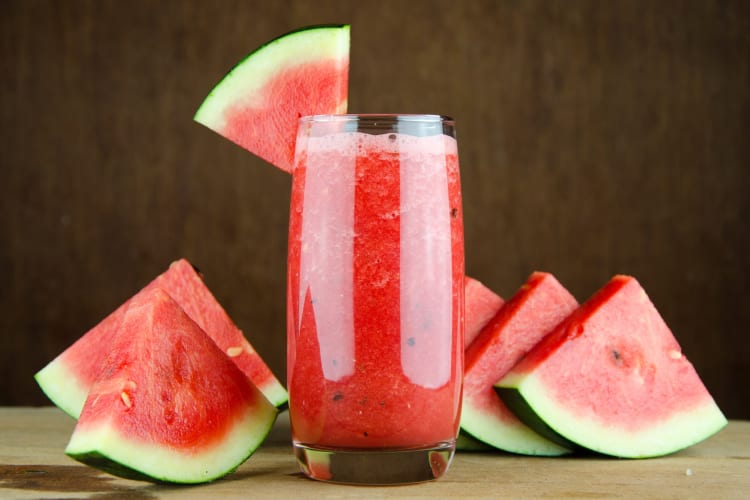
How Healthy Is Watermelon for You?
Okay, we now know watermelon is healthy for you. But why? Let’s break down the nutritional profile of the average serving of watermelon to see.
In one 280-gram (about 2 cups) serving, you’ll get on average:
- 85 calories
- 0.4 grams of fat
- 3 milligrams of sodium
- 314 milligrams of potassium
- 21 grams of carbohydrates
- 1.1 grams of dietary fiber
- 17 grams of sugar
- 37% DV vitamin C
- 7% DV magnesium
- 5% DV vitamin B6
As you can see, this fruit is low in calories, which makes watermelon healthy for you as a snack, especially if you are trying to lose weight. It’s also low in fat and provides vitamin C along with small amounts of other vitamins and minerals. Vitamin C can support iron absorption, immune function and skin health.
Compared with fruits like blueberries, oranges and apples, watermelon is lower in fiber but higher in water, which can make it a refreshing option as part of a balanced mix of fruit choices. The one potential drawback, as covered above, is that the fruit is quite high in sugar.
So, while it may be tempting to eat a lot due to its low amounts of calories and fat, it’s sensible to enjoy watermelon in moderation to keep sugars in check while still getting its benefits.
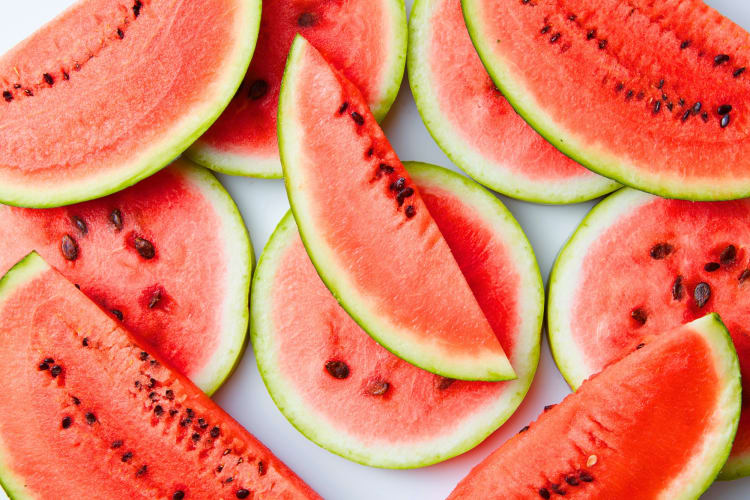
What Are the Health Benefits of Watermelon?
By now, you’re pretty much an expert in what makes watermelon good for you, but it’s always useful to recap exactly how eating watermelon helps your health. Some potential health benefits of watermelon include providing antioxidants, supporting hydration and offering a light, low-calorie snack option.
You’ll also get a small amount of potassium when you eat watermelon, and thanks to its delicious taste, it is a popular healthy snack for kids and adults alike. But what, specifically, will watermelon do for you? Here are some of the primary watermelon health benefits.

1. Antioxidants and Hydration
Immune support and overall health
Watermelon offers vitamin C, lycopene and hydration that can support overall health. No single food prevents disease, but including fruits like watermelon in a varied, balanced diet is associated with positive outcomes. It’s often called a “superfood,” but that term is marketing, not a medical designation.
Heart health
As reported by Medical News Today, researchers are studying compounds in watermelon, including lycopene and citrulline, for potential roles in heart health. Findings relate to overall dietary patterns and study designs, not watermelon alone.
Cell protection
Antioxidants in watermelon, such as vitamin C and lycopene, help the body counter oxidative stress. Antioxidant-rich foods can support your natural defenses, though they do not cure or prevent disease.
Skin health
Hydration supports skin function, and watermelon’s high water content can help you meet fluid needs. Its vitamin C contributes to collagen formation. Watermelon won’t prevent skin aging or sun damage, but it can be a refreshing, nutritious choice within a balanced eating pattern.
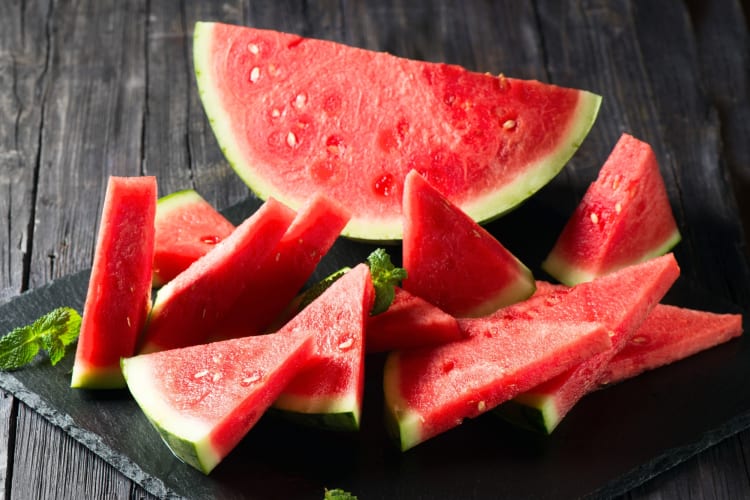
2. Workout Recovery
If you enjoy activities like pilates, running, playing team sports or weightlifting, your body is probably used to regular, strenuous activity — and that means you need to pay special attention to nutrition for recovery purposes. And that doesn’t just mean eating a healthy protein bar or drinking a protein shake: watermelon is beneficial as well!
If strenuous exercise is a regular part of your life, watermelon is healthy for you not only because it’ll keep you hydrated, but also because it helps with fluid intake and provides a small amount of potassium. It can be a light and hydrating choice after activity, though it doesn’t replace the protein needed for muscle repair.
Plus, it’s an all-natural alternative to the additive-filled foods that are often marketed at athletes and fitness enthusiasts for the same purposes (even though it may not offer the same benefits or nutritional profile as these items).

3. Maintaining a Healthy Weight
We’ve already established that eating nothing but watermelon isn’t a great dieting idea, but even so, watermelon is healthy for you as part of a weight-loss approach. Its high water content can help you feel refreshed and satisfied in the short term, making it a light snack option when you want something sweet.
Some unhealthy weight-loss plans cut out entire food groups or limit nutrient variety, which can make it harder to meet your needs. Including fruits like watermelon within a balanced diet can help you meet your goals while still enjoying foods you like.

4. Hydration
There’s been a silly but true saying going around in the fitness community lately: “hydrate or die-drate.” While the results of poor hydration are rarely that dramatic, it’s hard to overstate how important it is to drink enough water.
And if drinking enough water on its own is a challenge for you, you’ll get a lot of that hydration by eating watermelon. It’s right there in the name, and its hydrating power is one of the biggest reasons watermelon is healthy for you.

How To Incorporate Watermelon Into Your Diet
Now that we've answered the question "Is watermelon healthy?", how can you best include it in your healthy eating plan?
As covered, the best way to eat watermelon is as it comes. However, if you don't want plain watermelon as a snack all the time, there are some other ways to incorporate it into your diet in healthy ways.
Popular ways to eat watermelon include adding it to summer salads like watermelon and feta salad or blending it in smoothies with other healthy vegetables and fruits.
It also goes great with other fruits in a fruit salad. You could even try making watermelon gazpacho or adding it to skewers with healthy cheeses like feta and mozzarella pearls, other melons like cantaloupe, and a small amount of prosciutto.
Whether you're looking for lunch food ideas, summer BBQ dishes or just a healthy and refreshing snack, watermelon is a delicious and nutritious ingredient to incorporate into your meal plans.

There are plenty of reasons watermelon is healthy for you, and only a few things to keep in mind. Whether your goal is weight loss, healthy skin or feeling refreshed after a workout without all the additives of a sports drink or protein bar, you’ll find that watermelon offers great benefits.
Therefore, it isn’t entirely surprising that watermelon is often promoted as a light, weight-management-friendly snack. However, it’s important to remember that you can easily have too much of a good thing.
While watermelon is healthy for you and deserves every bit of its reputation for nutritional benefits, it’s still important to moderate your intake and consider things like its high sugar content. Not to mention, it’s nearly always unwise to rely too heavily on a single food.
So you may hear of fad diets and wonder, “Is watermelon that healthy for you?” or specifically, "Is watermelon healthy for weight loss?" and these are valid questions. But it doesn’t change the facts: the quintessential summer cookout fruit deserves a place in any healthy, balanced diet.
For even more ways to explore your favorite foods, check out other experiences happening on Cozymeal.
